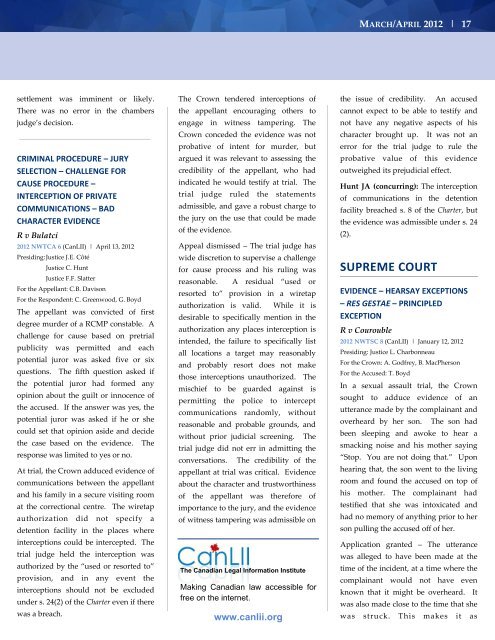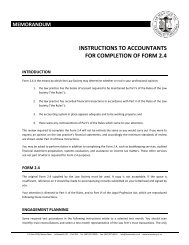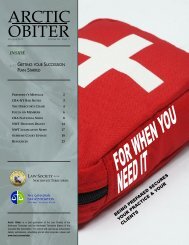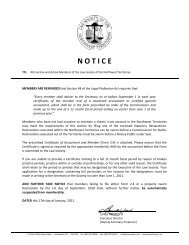ARCTIC OBITER
March/April 2012 - Law Society of the Northwest Territories
March/April 2012 - Law Society of the Northwest Territories
- No tags were found...
You also want an ePaper? Increase the reach of your titles
YUMPU automatically turns print PDFs into web optimized ePapers that Google loves.
MARCH/APRIL 2012 | 17<br />
settlement was imminent or likely.<br />
There was no error in the chambers<br />
judge’s decision.<br />
CRIMINAL PROCEDURE – JURY<br />
SELECTION – CHALLENGE FOR<br />
CAUSE PROCEDURE –<br />
INTERCEPTION OF PRIVATE<br />
COMMUNICATIONS – BAD<br />
CHARACTER EVIDENCE<br />
R v Bulatci<br />
2012 NWTCA 6 (CanLII) | April 13, 2012<br />
Presiding: Justice J.E. Côté<br />
Justice C. Hunt<br />
Justice F.F. Slatter<br />
For the Appellant: C.B. Davison<br />
For the Respondent: C. Greenwood, G. Boyd<br />
The appellant was convicted of first<br />
degree murder of a RCMP constable. A<br />
challenge for cause based on pretrial<br />
publicity was permitted and each<br />
potential juror was asked five or six<br />
questions. The fifth question asked if<br />
the potential juror had formed any<br />
opinion about the guilt or innocence of<br />
the accused. If the answer was yes, the<br />
potential juror was asked if he or she<br />
could set that opinion aside and decide<br />
the case based on the evidence.<br />
response was limited to yes or no.<br />
The<br />
At trial, the Crown adduced evidence of<br />
communications between the appellant<br />
and his family in a secure visiting room<br />
at the correctional centre. The wiretap<br />
authorization did not specify a<br />
detention facility in the places where<br />
interceptions could be intercepted. The<br />
trial judge held the interception was<br />
authorized by the “used or resorted to”<br />
provision, and in any event the<br />
interceptions should not be excluded<br />
under s. 24(2) of the Charter even if there<br />
was a breach.<br />
The Crown tendered interceptions of<br />
the appellant encouraging others to<br />
engage in witness tampering. The<br />
Crown conceded the evidence was not<br />
probative of intent for murder, but<br />
argued it was relevant to assessing the<br />
credibility of the appellant, who had<br />
indicated he would testify at trial. The<br />
trial judge ruled the statements<br />
admissible, and gave a robust charge to<br />
the jury on the use that could be made<br />
of the evidence.<br />
Appeal dismissed – The trial judge has<br />
wide discretion to supervise a challenge<br />
for cause process and his ruling was<br />
reasonable.<br />
A residual “used or<br />
resorted to” provision in a wiretap<br />
authorization is valid.<br />
While it is<br />
desirable to specifically mention in the<br />
authorization any places interception is<br />
intended, the failure to specifically list<br />
all locations a target may reasonably<br />
and probably resort does not make<br />
those interceptions unauthorized. The<br />
mischief to be guarded against is<br />
permitting the police to intercept<br />
communications randomly, without<br />
reasonable and probable grounds, and<br />
without prior judicial screening.<br />
The<br />
trial judge did not err in admitting the<br />
conversations.<br />
The credibility of the<br />
appellant at trial was critical. Evidence<br />
about the character and trustworthiness<br />
of the appellant was therefore of<br />
importance to the jury, and the evidence<br />
of witness tampering was admissible on<br />
The Canadian Legal Information Institute<br />
Making Canadian law accessible for<br />
free on the internet.<br />
www.canlii.org<br />
the issue of credibility.<br />
An accused<br />
cannot expect to be able to testify and<br />
not have any negative aspects of his<br />
character brought up.<br />
It was not an<br />
error for the trial judge to rule the<br />
probative value of this evidence<br />
outweighed its prejudicial effect.<br />
Hunt JA (concurring): The interception<br />
of communications in the detention<br />
facility breached s. 8 of the Charter, but<br />
the evidence was admissible under s. 24<br />
(2).<br />
SUPREME COURT<br />
EVIDENCE – HEARSAY EXCEPTIONS<br />
– RES GESTAE – PRINCIPLED<br />
EXCEPTION<br />
R v Courouble<br />
2012 NWTSC 8 (CanLII) | January 12, 2012<br />
Presiding: Justice L. Charbonneau<br />
For the Crown: A. Godfrey, B. MacPherson<br />
For the Accused: T. Boyd<br />
In a sexual assault trial, the Crown<br />
sought to adduce evidence of an<br />
utterance made by the complainant and<br />
overheard by her son.<br />
The son had<br />
been sleeping and awoke to hear a<br />
smacking noise and his mother saying<br />
“Stop. You are not doing that.” Upon<br />
hearing that, the son went to the living<br />
room and found the accused on top of<br />
his mother. The complainant had<br />
testified that she was intoxicated and<br />
had no memory of anything prior to her<br />
son pulling the accused off of her.<br />
Application granted – The utterance<br />
was alleged to have been made at the<br />
time of the incident, at a time where the<br />
complainant would not have even<br />
known that it might be overheard. It<br />
was also made close to the time that she<br />
was struck. This makes it as
















